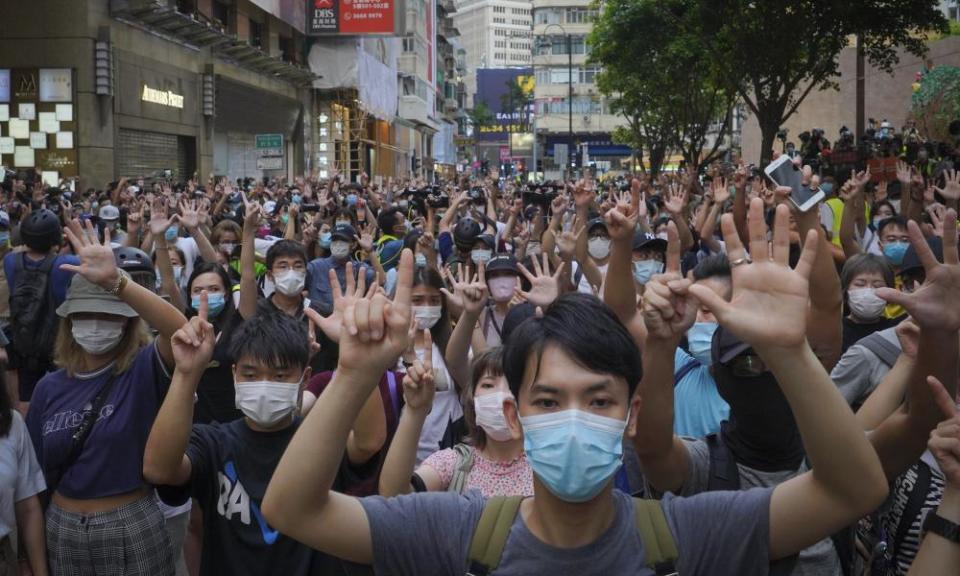How many Hongkongers will want to come to Britain is unclear

The Foreign Office claim that 200,000 Hong Kong citizens will want to come to the UK over the next five years to take up Britain’s offer of citizenship is a very broad estimate and not a forecast, diplomats admit.
The figure suggests less than 10% of the 3 million Hongkongers eligible for a British National Overseas passport will be attracted to a new life in Britain.
The estimate is dependent on at least five unpredictable variables: the degree of repression in Hong Kong imposed by the Chinese government, the rival attraction of other states such as Taiwan, the US and Australia, the precise conditions still to be attached to the UK offer by the Home Office, the future state of the UK jobs market, and the obstacles placed in the way of those trying to leave Hong Kong by the Chinese government, a factor that may turn on the direction of future Chinese UK relations.
Unsurprisingly, any estimate is loaded with caveats.
But those making these estimates will look at the recent history of previous waves of Hong Kong emigration. Many Hongkongers upped sticks in the late eighties as the UK prepared to negotiate the handover to China from 1997. Denied any self-government, and sceptical that China would leave Hong Kong alone for 50 years, many people voted with their feet after the 1984 Sino-British joint declaration.
Emigration to other countries, running at 20,000 a year in the early 80s, rose to 40,000 and reached over 60,000 in 1990, in the wake of the Tiananmen Square massacre.
By 2017 the number of emigrants had fallen to 6,500, a 12-year low. Instead, a wave of reverse migration started with many Hongkongers resident in cities such as Vancouver returning.
Throughout the first two decades of this century, America, Australia and Canada were the three most popular destinations, the 2011 census showed. But Boris Johnson had not then made the UK’s pathway to citizenship offer.
And the desire to leave now may be higher than in the Nineties as citizens confront the reality, and not just the prospect of Chinese rule, and the disappointment of being so close to forming a democracy. That 600,000 voted in the recent primaries shows the solid support for freedom in the city.
But the numbers coming to the UK may be reduced by the likelihood that Hongkongers may wish to join the large existing immigrant communities closer to Hong Kong. Taiwan in particular is planning to roll out the red carpet for migrants.
The UK offer including the right to live and work in the UK is generous but still couched in uncertainty, including the costs to those applying for citizenship. It is also not being made to those born after 1997, excluding the young that formed the heart of the protest movement. Nathan Law, the prominent dissident, has made it to the UK in the last few days, but how many will be granted political asylum is not yet clear.
UK government officials are acutely aware that they do not have a great track record in making immigration projections, underlining how difficult it is to project the push and pull factors at play. The Home Office in 2004 estimated that only 8,000 to 13,000 migrants from eastern and central Europe would come to the UK when the government lifted free movement restrictions. The forecast assumed wrongly that most other EU states would open their borders, but they did not. The number from Europe ended up being 20 times higher than predicted, with 112,000 nationals from the accession countries entering in 2007, igniting the debate on free movement that contributed to the vote for Brexit in the 2016 referendum.
Similarly, controlling the flow of migrants by setting targets or projections has a poor track record. David Cameron in 2010 promised to cut net migration into the UK to below 100,000, promising no ifs, no buts. It hung round his neck for five years, as the economy started to grow in 2012 and by the end the status of the target had collapsed to an aspiration.
At present there is little sign that migration of Hong Kong is politically explosive in the UK. That may be because migration is no longer such a salient issue. But a YouGov survey also showed support for the government’s sense of historic responsibility. The survey revealed that by 64% to 22% the public approved of the government’s proposals, with only 14% saying they did not know. There was little or no distinction based on party allegiance. One caveat: only half said they knew what the government had proposed.
But the unquantifiable degree of welcome given to Hongkongers in the UK is not likely to be a decisive factor. Other factors like stamp duty holidays, the state of the UK’s economic recovery and the quality of education may matter as much.

